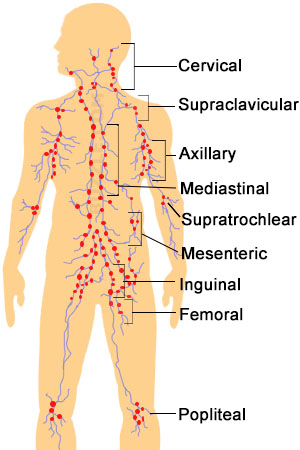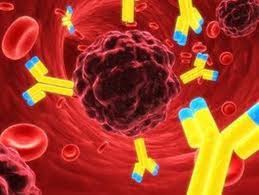Lymphoma is a cancer of lymph cells. Lymph cells (also called lymphocytes) are a type of blood cells that are known as white blood 
Cancer cells in lymphoma mainly gather in lymph nodes — small structures present along blood vessels. As the cancer cells grow and multiply, the lymph nodes enlarge and form lumps. Most of the time, this cancer is detected as painless lumps in the neck, armpits or groin. Several other warning signs and symptoms of lymphoma include fever, weight loss and sweating at night. Lymphoma can also affect other organs of the body (besides lymph nodes) and give rise to a variety of symptoms that bring an individual to a doctor.

Painless lumps in your neck, armpits or groin – This is the most common symptom and often the only one. These are enlarged lymph nodes. Most people first notice these lumps while bathing or changing, or they may be first felt by your partner. Enlarged nodes are not always a sign of lymphoma.
Weight loss – Weight loss usually occurs rapidly for no known reason. Often an individual can lose ten to fifteen pounds over a couple of months.
Excessive sweating at night – This unique situation may be quite bothersome. You may wake up at night drenched in sweat without any apparent reason.
Itchiness all over your body – Another unique situation, full-body itching is related to the secretion of some special chemicals from the lymphoma cells.
Loss of appetite – As lymphomas spread within your body and grow in size, many individuals feel a considerable loss in their appetite, further accelerating weight loss. Weight loss of more than 10% is one of the B-symptoms of lymphoma.
A feeling of weakness – As cancer cells are always growing, they use up more of the body’s nutrients, leaving the body with less. This makes you feel weaker.
Diagnosis of Lymphoma Cancer
There are four main types of treatment for lymphomas:
- Chemotherapy – Drugs that are administered as infusions in your veins or as pills. Common chemotherapy schedules include ABVD, R-CHOP and CHOP.
- Radiotherapy – High energy rays that are directed at the tumor. Radiotherapy can be delivered over small areas (involved field radiation ) or large areas (extended field radiation).
- Antibody therapy (also called biological therapy) – Using drugs like Rituximab that target special molecules on the surface of cancer cells.
- Bone marrow or stem cell transplant – Using high doses of chemotherapy or radiation to kill all cancer cells while saving the bone marrow with transplantation of marrow or stem cells

 Click to WhatsApp
Click to WhatsApp +91-9899993637
+91-9899993637




